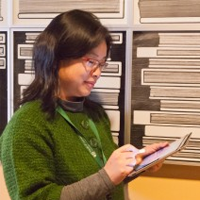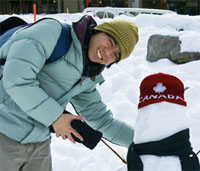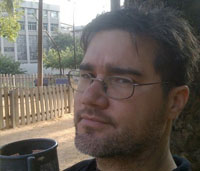[Spring Workshop 2012] Keynote and Facilitators
Spring Workshop 2012 Keynote:
Alexandra Samuel
alexandrasamuel.com | @awsamuel
Alexandra Samuel is the Director of the Social + Interactive Media Centre at Emily Carr University, and the co-founder and principal of Social Signal, one of the world’s most experienced social media agencies.
At the SIM Centre, Alex leads applied research that helps companies leverage the university’s strategic, design and creative expertise in digital media. The Centre’s projects range from helping Paperny Films conceive its successful Eat Street app with Invoke Media, to creating an innovative ebook for the Mozilla Foundation. Alex’s own research focuses on how people cope with information overload in order to build meaningful lives online; this research drives her blogs for Oprah.com and the Harvard Business Review.
Through Social Signal, Alex has conceived and led online community projects for clients including the BC Children’s Hospital Foundation, CompuMentor’s NetSquared, the Mountain Equipment Co-op, The Elders, the PLAN Institute, BC Hydro, the Intermational Development Research Centre of Canada, and Vancity. The community she conceived and developed for Vancity, ChangeEverything.ca, was a 2008 Webby nominee.
She lives in Vancouver, Canada with her husband and Social Signal partner Rob Cottingham and their two children. Alex’s insights on meaningful living online are on her blog at alexandrasamuel.com and on twitter as @awsamuel.
Spring Workshop 2012 Session Facilitators:
- Peter Arthur (How Students Create Learning Networks and Leverage Digital Content to Enhance Learning)
- Jo Axe and Samantha Wood (Pecha kucha: Benefits and challenges of using the 20/20 approach as an assessment tool)
- Judy Chan , Brian Lamb, and Zack Lee (Course design beyond the Horizon: A case study and a thinking session)
- Carlos da Cruz Alves, Amanda Coolidge and Keiron McConnell (Redesigning a Case Study Learning Activity using Video and Google Maps…and how YOU can do it too!)
- Sylvia Currie and the Steering Committee for ETUG (Playing with Spidergrams, Action Notebooks, and Crayons: Exploring ETUG Community Orientations Together)
- Irwin DeVries (OERu: A view from the inside)
- Sue Doner and Co-panelists Kate Seaborne, Emily Schudel, Judy Somers and Keith Webster (Evolving a practice for sustainable professional staff development )
- Bryan Hartman (A Case Study of Educators’ Learning and Development of Innovative Educational Technology Competencies)
- Paul Hibbitts (Mobile Learning User Experience (UX) Design: Leveraging WordPress for Mobile Learning)
- Melissa Jakubec , Michelle Harrison and Griff Richards (Innovation through Research: Searching for Effective Learning Designs)
- Kevin N. Kovalycsik (Enhancing Learning Applications for iPad for the Classroom and Beyond)
- Mike Minions (Quest for the Grail)
- Michael Paskevicius (Overview of Educational Technology Innovation in South Africa)
- Robin Popow (YouTube Video – Hands-on)
- Lisa Read (Slowing down a Quick Response)
- Jennifer Stein, Meghan Moore, and Gilbert Nousssitou (Choosing the Right Recipe for E-PPRENTICE Success)
- Jonathan Strang (Pin the tag on the curator: Web curation and education)
- Cindy Underhill and Sharon Doucet (Just Do It: Confessions From a Student-Led Project)
- Robert Walker (ExPod – Computer Assisted Simulation Training)
- Keith Webster (Moodle 2 Mobile: Efficient Optimization for Content from LMS to iOS)
- Lucas Wright and Luisa Canuto (Bloggiamo in Italiano: Fluency, Collaboration and Connection)

Peter Arthur
University of British Columbia Okanagan
As director, Peter works with a great Centre team to support teaching and learning excellence at UBC Okanagan. Peter facilitates a number of seminars, communities of practice and programs. In addition, he contributes to many university committees related to teaching and learning. Peter is also a member of the Faculty of Education, where he teaches instructional design at the graduate level and learning technology classes at the undergraduate level. He also supervises a number of graduate students.
Presentation: How Students Create Learning Networks and Leverage Digital Content to Enhance Learning
Technology can provide students with the ability to connect, collaborate, create and share knowledge with peers and experts locally and around the world. This session will discuss how some students are creating learning networks and leveraging digital content to enhance learning outside of the classroom. Participants will have the opportunity to share how students are using social networks, online communication tools, open educational resources and other digital technologies to enhance learning. In addition, barriers that prevent more students from implementing these learning strategies will be discussed and most importantly how we support this type of learning.
Jo Axe
Jo Axe is an Associate Professor in the Division of Education Studies at Royal Roads University in Victoria, British Columbia. Jo has taught in the face-to-face, blended, and distance learning environments at both the undergraduate and graduate level. Her research interests include learning community development, student engagement in the online environment, and aboriginal post-secondary education.
Samantha Wood
Samantha Wood is the Program Manager for the Bachelor of Commerce Program at Royal Roads University (RRU) in Victoria, British Columbia, Canada. Samantha holds a B.A. in Sociology from the University of British Columbia and an M.B.A. from the University of Calgary, plus a Graduate Certificate in Executive Coaching from RRU. Her research interests include the role of entrepreneurship education in “making” entrepreneurs, and the role of the learning community in undergraduate education.
Pecha kucha: Benefits and challenges of using the 20/20 approach as an assessment tool
The online and on-campus BCom programs at Royal Roads University recently underwent a redesign. One of the challenges of the redesign was to explore ways in which students could be introduced to the contributions made by Sociology, Psychology, Anthropology, Political Science and History as they relate to the behaviour of individuals, organizations, and society. As a result, ENMN 325 Social Sciences for Business was developed to provoke discussion and advance students’ familiarity with the role played by social science in non-market strategies.
In the workplace today, employers stress the need for employees who have expertise in the use of technology and have clear communication skills. In an attempt to partner these two attributes, the developers of Social Sciences for Business incorporated an assignment to be delivered using the pecha kucha approach to presentation, thereby allowing students to develop and practice their proficiency in a safe environment. While there were some highlights, there were also several problems that emerged. By embracing reflective practice and adopting an iterative approach to course development, the course instructors and designers examined their experiences and explored ways to improve the pecha kucha assignment for the next course offering.
In this session, we discuss the benefits and challenges of program redesign, as well as those associated with implementing a new assessment tool. We will share the pecha kucha marking rubric, talk about the complexities involved in implementing it as an assessment tool, and provide our thoughts for moving forward. In addition, we will encourage participants to share their own experiences as they contribute to the discussion on effective use of the pecha kucha in the online and face-to-face classrooms.
Judy Chan:
University of British Columbia
I work at the University of British Columbia. I have two roles there. I work full-time at the Centre for Teaching, Learning and Technology (CTLT) as an Educational Developer where I work with faculty members to help them find ways to enhance student learning. More….
Zack Lee:
University of British Columbia 
Zack supports the development of resources for the programs and services at CTLT, focusing on information design and architecture. He is interested in the intersection of individual participation, new forms of expression and technology. He facilitates a variety of workshops and sessions on learning technologies (e.g. UBC Blogs,UBC Wiki). Only occasionally does he blog at http://scrapingthefringe.org
Brian Lamb:
Teaching and Learning Strategist, CTLT 
Brian does his best to keep up with the constant developments and new applications of learning technology, copyright, and online culture at UBC and beyond. He mutters ill-tempered observations on social learning, open education, creative use of technologies and other such things on his weblog, Abject http://abject.ca
Presentation: Course Design Beyond the Horizon: A Case Study and a Thinking Session
What’s the next big step for a course that has already opened up its content, taught via a tablet and implemented authentic assessment? The instructor will present the course as a case study, discussing how open practices were complemented by a private learning management system, and how team projects creating public resources enhanced students’ learning within the context of a large, lecture-based science course.
These are all positive developments. But what’s next? That’s where we hope the ETUG community will come in.
Participants of this session will work with us to re-design future iterations of this course using new technologies and practices, including those described by recent Horizon Reports, and other innovations highlighted at the 2012 ETUG workshop. We will focus on both motivations and methods: why do we use these approaches to enhance students’ learning, and how do we implement them?
As participants work through this process with us, suggestions and strategies will be collected and shared through a publicly accessible resource where they can retrieve ideas, make changes or provide further suggestions. We hope participants will also be able to apply the strategies in their own contexts, adapting them for their own courses and institutions.
Carlos da Cruz Alves
Royal Roads University
Carlos is an Interactive Media Developer at the Centre for Teaching and Educational
Technologies, Royal Roads
University. He started in June 2007 as a Web Developer, and now is responsible for creating multimedia objects for online courses and supporting faculty in their use of learning technologies.
The highlights of Carlos’ professional background include being a Computer, Audio and Video Consultant with vast experience in multimedia. He has developed and authored many technology learning resources, such as teaching tapes, CDs and DVDs. Carlos has also been a Radio Producer and Technician, Computer Programming Lab Teacher and a Math and Physics Tutor. In addition, he was also an Administrative Manager at a nonprofit organization. Carlos is currently enrolled in the Master of Arts in Learning and Technology at Royal Roads University.
Amanda Coolidge
Instructional Designer, Royal Roads University
Amanda Coolidge is an Instructional Designer in the Center for Teaching
and Educational Technologies at Royal Roads University. Amanda joined RRU in June of 2010. Previously at BCIT, Amanda has extensive Educational Technology experience and Instructional Design expertise. Prior to BCIT she lived and worked in Nairobi, Kenya as the Senior Educational Technology Specialist for the Open Source project TESSA (Teacher Education in Sub Saharan Africa).
Amanda is also the current Chair for the Educational Technology User’s Group (ETUG).
Keiron McConell
Police Officer and Associate Faculty at Royal Roads University
Keiron holds a Bachelor of General Studies Degree from the Open
University of British Columbia, a Masters of Science Degree in Policing and Public Order Studies from the University of Leicester, a Diploma in Police Leadership from Dalhousie University and a Certificate in Public Sector Leadership from Royal Roads University. This academic achievement combined with 22 years of operational experience with a large Criminal Justice Agency provides a solid background for developing and teaching participants interested in Justice Studies.
In addition, Keiron has worked for several other agencies in providing consulting services. These have included the Royal Saudi Arabian Police, Peoples Republic of China Police, British Superintendents Association, British Columbia Sheriffs, British Columbia Conservation Officers, and Simon Fraser University.
Keiron instructed at the Justice Institute of British Columbia Police Academy for 3 years in Professional Patrol Tactics and continues as a guest lecturer. In addition, he is a faculty member at Kwantlen Polytechnic University, Royal Roads University and at Douglas College in the Criminology Program. Furthermore as a regular guest instructor of Simon Fraser University policing program, Keiron has an up to date understanding of current policing trends.
Keiron is the President of KMc Training Corp which provided increment course training to police officers. Moreover, Keiron is a regular presenter on the topic of Bar Watch as a gang prevention, intervention, suppression program. He has presented to many police agencies, community groups and government across British Columbia and Canada. Keiron is the co-author of the textbook, “Legal and Regulatory Influences for Public Safety Communications” (co-authored by Joanne Beamish, and edited by Alice McPherson). Research interests include public disorder, gang prevention and intervention, routine activity theory, and police subculture theory. Keiron is currently a Doctorate Candidate at the London Metropolitan University in London, England.
Presentation: Redesigning a Case Study Learning Activity using Video and Google Maps…and how YOU can do it too!
This session brings together a team of three- a content developer (Instructor), an Instructional Designer, and an Interactive Media Developer. Together, using a team based approach, the session will showcase how a case study learning activity in a Justice Studies course was transformed from entirely text based to a series of interactive videos and Google maps activity. Police Officer and content expert, Keiron McConnell will talk about the case study activity and its relevance to the real world situations that arise in a Justice environment. He will also present feedback from students and their reaction to the media elements included in the course. Did the students find the change helpful and engaging? Or was it an Ed Techie’s idea of an innovative strategy without pedagogical thought? Further, the session will highlight the process taken and how participants can create the same transformation on their own, without expert media team members.
Sylvia Currie & the Steering Committee for ETUG 
BCcampus | http://blog.webbedfeat.com
Sylvia is Acting Director, Professional Learning at BCcampus and spends her days working with people who want to learn from other people through networks, communities of practice, and events. She helps to steward several online communities, including SCoPE, ETUG, and BC Moodle Users.
Playing with Spidergrams, Action Notebooks, and Crayons: Exploring ETUG Community Orientations Together
ETUG has a tradition of experimenting with technologies to support our community activities, largely driven by the steering committee leadership model. As new technologies emerge, it is interesting to try them out and think about how we can integrate them into our practice. However, one approach that we don’t routinely implement with the ETUG membership as a whole, is to identify our community orientations to assess how well our current tools and processes actually support them. For example, how well do we support open-ended conversations? Special interest groups and projects? Access to expertise? Likewise, we rarely find occasions for those important conversations that lead to future plans for the ETUG community. Using the Digital Habitats planning templates (http://technologyforcommunities.com/), this workshop (or?) will be a participatory activity to visually map out where we are, where we we would like to go, and to consider the the tools, roles and processes we need to support our community activities. This workshop will model an innovative way to engaging members of any community of practice in reflective conversations about how their activities and technologies intersect.
Irwin DeVries 
Thompson Rivers University, Open Learning | http://idevries.com
Irwin is the TRU Open Learning representative to the OERu initiative. TRU is one of the 15 OERu founding anchor partner institutions.
OERu: A view from the inside
This presentation will give a first-hand experience of the work being undertaken in the Open Education Resource University, a collaboration of 15 institutions (including UNESCO, Commonwealth of Learning and BC Campus) committed to providing free or low-cost higher education using open educational resources and emerging models of learner support and assessment.
Sue Doner
University of Victoria
Co-panelists: Kate Seaborne, Emily Schudel, Judy Somers, Keith Webster
Evolving a practice for sustainable professional staff development
In our unit (Distance Education Services, Division of Continuing Studies, University of Victoria), we share a common set of goals around professional development. We believe in:
• sharing, questioning and confirming understandings of our practice;
• encouraging colleagues to develop new lines of thinking and special interests that benefit the whole;
• mentoring new staff and mentoring each other, creating capacities & redundancies in terms of staff knowledge and skills.
However, we have also shared challenges in realizing these goals in our organizational environment. Based on our own past experiences (e.g. a failed “reading club”; setting aside 1-day/week for pro-d; conference attendance with no formal share-back strategies), we recognize the difficulties in implementing a professional development plan in conjunction with individual workloads and organizational responsibilities. We have spent time identifying specific barriers that impeded successful professional development practice in the past—including time, money, qualified human resources, and institutional policies and procedures—and are evolving new practices that build capacity and should be organizationally sustainable.
In our session, we will focus on four approaches to professional staff development that involve all members of our unit in a cycle of planning and implementing activities for both the group and for individuals:
- Professional Development Funds
- Instructional design & course technology case-study discussions
- The informal, 1-month “mini-leave”
- Development of web-based resources for instructors and course teams
We’ll reflect on what we’re learning from these approaches and how we are contextualizing our learning at the personal and the organizational levels.
We’ll invite participants to become our “critical friends” and “test” our thinking about the professional staff development approaches we are taking and the interpretations we’re making.
Bryan Hartman
University of Northern British Columbia http://www.unbc.ca/education/faculty.html
Bryan Hartman is a Professor in the School of Education at the
University of Northern British Columbia — and a Vancouver Community College graduate. His academic interests include the utilization of educational technology to facilitate teaching and learning, the influence of media on human development, and higher education initiatives to improve academic achievement and student retention.
A principal research interest since he moved to UNBC is in developing, implementing, and evaluating the use of new instructional technologies to assist the University to offer degree program courses for students located in the widely-distributed communities of northern British Columbia.
Educators’ Acquisition of Innovative Information Technology Competencies
This presentation reports the results of a retrospective study of the life-long, information technology (IT) learning experiences of experienced educators to determine if there are common patterns of experience explaining the acquisition and development of their IT competencies for teaching today’s “tech-savvy” students. These educators completed IT autobiographies that included a timeline of the major IT milestones and spaces to write biographical explanations of their personal learning experiences with the milestones that were relevant to them. To assist recall, each date-located milestone was graphically illustrated and verbally captioned to explain its historical significance. Mixed-methods analyses of the autobiographies indicated that emergent technologies frequently set trends that supported the learning of both those new technologies and IT in general. One example is that a quantitative comparison of the participants’ education experiences indicated that informal education was significantly more important than formal education for the development of their IT competencies. Another is that a qualitative analysis indicated that there are several common patterns of experience that have facilitated the development of these educators’ IT competencies. Collectively, the results of this study suggest that educators acquire their IT competencies as a result of unique patterns of both informal and formal IT learning opportunities.
Paul Hibbitts
Simon Fraser University | http://www.paulhibbitts.com/
Paul D. Hibbitts lives in Vancouver, BC and established Hibbitts
Design in 1998 to provide his clients personalized user-centered design, interaction design, and training services. He helps teams with hands-on design and with coaching to improve user experiences for a range of contexts, including desktop applications, mobile devices, and the web.
Leveraging WordPress for Mobile Learning: A Case Study
Creating a mobile learning companion for a course or seminar is a great way to enhance face-to-face teaching, but doing so effectively presents both design and technical challenges. For the Fall 2011 offering of Paul’s user interface design course (CMPT-363) at Simon Fraser University he undertook the task of creating a mobile course companion for his students. In this presentation Paul will guide you through the fundamentals of mobile learning, including its potential role in formal learning, how to use UX viewpoints and techniques to provide more effective mobile learning, and demonstrate his SFU mobile course companion. He will also share the reasons why he choose WordPress for delivering mobile learning, and provide a brief guided tour of the key plugins and customizations used to deliver a great mobile learning user experience.
Melissa Jakubec
Thompson Rivers University, Open Learning
Melissa Jakubec has been involved in post-secondary education for more than 20 years, teaching English as a Second Language before becoming an Instructional Designer in TRU’s Open Learning Division, where she currently serves as chair. She believes in providing student-centered, contextualized, and meaningful instruction, as well as in using technology to enhance the learning process. Many of her instructional design projects have been in the areas of the health and social service professions.
Michelle Harrison
Thompson Rivers University, Open Learning
Michelle has been an educator for over 10 years, and is currently an Instructional Designer, as well as an instructor in the graduate certificate in Online Teaching and Learning, at TRU Open Learning. She strives to create active and engaging technology enhanced learning environments, both in her design and teaching contexts. Her current research interests are in Learning Design and incorporating student perspectives and feedback evaluation into instructional design and teaching practice.
Griff Richards
Thompson Rivers University, Open Learning
Griff Richards has 30 years of experience designing innovative systems for education. His focus is on ideas that plug into the mind rather than gadgets that plug into the wall (or these days, the internet). The problem is not coming up with innovations, the problem is getting them properly evaluated before they are replicated.
Innovation through Research: Searching for Effective Learning Designs
Our presentation will focus on an innovative research project we have undertaken in an effort to ensure the quality of the educational experiences we develop as instructional designers. As part of our goal to develop learning experiences that are engaging and meaningful to learners a distance environment, we have engaged in a research project to:
• Create a set of promising learning design patterns that work in our organizational context, and
• Develop a way to evaluate learning activity designs/patterns so that they can be improved, thereby improving our ability to innovate as we design learning experiences.
This presentation will describe our research context and learning design. We will share the results of early workshops and focus groups with instructional designers about learning activities, as well as survey results from learners and instructors on the effectiveness of learning activities in online courses. We will also describe our proposed method for evaluating learning activity effectiveness and course designs at Thompson Rivers University Open Learning.
Throughout the presentation we will ask participants to relate our questions and experiences to their own context and to comment on our process. Finally, participants will work in groups to evaluate specific learning activities, considering their appropriateness in different contexts.
Kevin N. Kovalycsik
Vancouver Community College
Kevin Kovalycsik is the Department Head for the Bachelor of Hospitality Management Degree Program at Vancouver Community College. Passionate about the development and integration of new technology in business and the classroom, he has over 20-years of global executive and academic experiences, and is published worldwide.
Enhancing Learning Applications for iPad for the Classroom and Beyond
An interactive session communicating and using the very latest iPad applications (on the iPad 3) for the enhancement of the classroom learning experience and that beyond the classroom. Very lively. Informative. No iPad required but extremely useful to bring if one has it. Application groups will include: Productivity, Communication, News, Education Specific and more…
Mike Minions
Educational Technology Coordinator at Okanagan College | http://okanagan.bc.ca/edtech
Mike Minions has been the educational technology department at Okanagan College since 2005.
Before that he was the media production department for the Kelowna school district. Before that he made broadcast tv commercials in Kelowna and Halifax. He holds a Masters in Ed Tech and a BA in Philosophy from University of Calgary and a diploma in Broadcasting from Mount Royal College.
Quest for the Grail
One of the continuing fantasies at my institution is that there is some kind of magical device that we can put into a regular classroom that would let students join that class from wherever they happen to be (at home, on another campus, in Revelstoke). They would be able to see and hear and participate in whatever classroom activities might occur. It would not interfere with what the instructor normally does in the classroom, be inexpensive, possibly portable and lightweight, and definitely require no more than 30 seconds set-up by potentially technology-challenged instructors. Mike Minions from Okanagan College will share his explorations and experiments, the most current of which seems to be an iPad running UStream.
Michael Paskevicius
Vancouver Island University | http://www.bluelightdistrict.org/wp/category/research/
Having spent the last 6 years in Southern Africa working in knowledge
management, educational technology, open access and open educational resources, Michael recently joined Vancouver Island University as a Learning Technologies Application Developer in the teaching and learning centre.
Michael completed his Masters in Information and Communication Technologies in Education with the Centre for Educational Technology (CET) at the University of Cape Town (UCT). While working on his Masters he served as a technical analyst in the UCT open educational resources (OER) project.
Michael was involved in the early research on establishing OER at UCT; designed and built the technical infrastructure to support the indexing and sharing of OER; delivered training around OER and Creative Commons; and engaged in research investigating the impact of open scholarship at UCT.
His current research interests include learning and educational analytics, metadata and curation of online resources, knowledge management, mobile learning, social media in education and open scholarship.
Overview of Educational Technology Innovation in South Africa
This presentation will highlight my experience implementing and supporting innovation in teaching and learning at the University of Cape Town (UCT), South Africa. UCT is a large research-focused residential university and a leader in teaching and learning with technologies. The Centre for Educational Technology has had tremendous success implementing and supporting educational technology.
This session will identify strategies for supporting innovation using tools such as learning management systems, blogs, video capture and streaming technology. Participants will have an opportunity to reflect on their own educational technology landscape and potentially identify areas for collaboration. A discussion will follow the presentation which should allow us all to reflect on the similarities and differences in the north-south contexts.
Robin Popow
Vancouver Community College
Robin has been an Instructional Associate at the Centre for Instructional
Development since 2008. He received his Master of Education in Educational Technology and Learning Design at SFU in 2010. Robin is very accessible and shares his extensive knowledge of Education Technology applications and other aspects of adult education whenever asked.
Robin joined VCC as an Auto Collision and Auto Refinishing instructor in 2001 after 20+ years in the Auto industry. Prior to his move to the CID, Robin lead a distributed learning initiative and developed a flexible learning model for trades training.
Ever tried capsizing an inner tube? (Ever tried captioning in YouTube?)
Accessible media isn’t only beneficial for students with sight and hearing it extends learning opportunities for all students. Just as online discussion forums provide opportunities for students too shy to fully participate in face-to-face discussions, closed captioning on videos improves access to for those viewing videos in classrooms and for those with English as a second language. However, time and costs associated with creating transcripts and captioning have made such features impractical for most.
Recent improvements to the YouTube voice recognition feature provides time saving captioning and transcriptions but is it worth the time it takes to edit the transcription?
In this hands-on workshop you will learn tips for creating videos for YouTube that produce captions with fewer required edits. Additionally, you’ll upload your video to YouTube and produce accurate and accessible captioning and transcripts with minimal effort.
How this session came about: VCC has a high population of students with hearing and visual disabilities and as we have grown in our ability to produce multimedia content and college information we are challenged to provide access for all. Recently a small group of advocates for accessible media began researching practical ways to make this happen and this workshop is one product of that work.
Lisa Read 
Royal Roads and School District 79 | http://readlisaread.edublogs.org/
My life is at once restricted and made infinite by technology. By day, I am a not terribly mild-mannered middle school Information Technology teacher. Outside of school, I am a Social Media junky, and attend TEDx conferences for fun. I find like-minded adults to communicate with in my role as Associate Faculty for RRU, where I facilitate a course in the MALAT program. As much as the next “bright shiny” in technology excites me, I have a kind of a steam-punk view to re-purposing resources in a new way. My current focus is hybridizing Moodle and QR codes in my F2F classes
Slowing down a Quick Response
QR codes– those funny little 2 dimensional barcodes most often used by advertisers and marketers, have actually been around for almost 20 years. How can this old new technology offer a different way to share information? How have QR codes evolved, and how can they be employed in more meaningful and effective ways? Participants are encouraged to bring their mobile devices (please install a “QR” reader before the session) to explore and create QR codes in action. Ideas for both Instructional Design and Facilitation, in all settings.
Jennifer Stein, Meghan Moore & Gilbert Noussitou
Camosun College
Choosing the Right Recipe for E-PPRENTICE Success
Members of the Camosun College E-PPRENTICE Professional Cook flexible learning program development team will showcase the Industry Training Authority funded E-PPRENTICE cook project. Key to the development of this project was the innovative Instructional Design framework used to link technical and workplace training for Cook apprentices as well as blending f2f and online delivery.
By creating a robust online learning environment, where all three members of the learning team (e-pprentice, employer and instructor) met and interacted, we were able to support e-pprentices throughout their apprenticeship experience. We will discuss how we designed for sponsor (employer) participation in the learning process and how planning, designing, developing and piloting a program led to an innovative and enhanced apprenticeship experience.
Discussion of the pilot and evaluation results, next steps and lessons learned will follow. We will encourage open discussion with participants and facilitate a discussion of shared experiences with other developers and subject matter experts. This session will be used to capture best and promising practices.
Jonathan Strang 
Formerly UBC | Twitter: @jrstrang
Educated professional working in information studies and educational technology in Vancouver. I have both a MLIS and a PhD in ancient history. I’ve traveled extensively throughout Europe and the Middle East. I believe in sustainable living. My political point of view tends to be strongly liberal. I’m a technophile and I have an ongoing obsession with The Economist magazine.
Pin the tag on the curator: Web curation and education
The internet has made curators out of all of us. This session will focus on developing best practices for using web-based tools such as Evernote, HistoryPin, Pinterest and Twitter for education. This thinking session will attempt to write a best practices document for evaluating and using web curation tools in educational settings. Topics for discussion include controlled vocabulary, geotagging, and copyright. Participants will be asked to consider how they can improve findability and user experience for their favourite social curation tool. Participants may also be expected to give short introductions on tools unfamiliar to the group. By the end of this session, you will have greater familiarity with a broad range of tools and an understanding of how to employ them in your educational setting.
Cindy Underhill
University of British Columbia | https://cindyu.wordpress.com/ | Twitter: @cindyu.
Cindy Underhill is a Learning Resource Design Strategist with UBC’s Centre for Teaching,Learning and Technology and is engaged in a variety of projects related to the development of web based resources to support learning-wherever it happens. Cindy’s been a college instructor, considers herself a learner, is proud to be an amateur at most things and has been involved with educational technology and distance learning for the past several years at UBC. She blogs infrequently at: https://cindyu.wordpress.com/ and Tweets sporadically @cindyu.
Just Do It: Confessions From a Student-Led Project
When you want to design a resource or program for students – involve them or, better yet, let them take the lead! We’ll deconstruct a project to develop online learning skills toolkits for students by students at UBC. We’ll hear from students (in person and via video clips) about what they learned in the process of designing the toolkits and from the mentor/guide who supported them. Participants will share their thoughts about potential opportunities, challenges. We hope for a lively and frank discussion!
Robert Walker
Justice Institute of BC
Bob has over 25 years experience in the design
and development of inter-agency justice and public safety training and education at the Justice Institute of British Columbia’s (JIBC), School for Public Safety and Security. Bob is also the JIBC’s Simulation Specialist. His experience includes extensive multi-agency design, development and conduct of emergency management simulation based training exercises, including extensive involvement with the 2010 Olympic emergency exercise program.
Bob is currently working with Purdue University’s, Visual Analytic for Command and Control Interoperability Environments Center of Excellence to incorporate several visual analytic technologies into ExPOD to be used by the U.S. Department of Homeland Security’s exercise program. Bob is also involved with the Pacific Northwest Health Alliance’s cross border exercise program utilizing ExPOD.
ExPod : Computer Assisted Simulation Training
This session aligns with the topic of “Innovative Teaching and Learning – Designing for innovation.”
Learning is enhanced when students are engaged. Simulations can be an effective way to involve students in the learning process. Simulation training has proven invaluable as a means of developing critical incident decision-making skills; conveying deeper conceptual understanding of complex, dynamic processes; and developing strong, highly functioning individuals and teams. ExPod utilizes simulation technology to create an immersive learning environment where participants gain experience in critical incident decision making within a safe training setting. At the Justice Institute of BC, ExPod is used to build decision-making skills in all fields of public safety.
ExPod is designed to deliver interactive, problem-based immersive scenarios. Participants, working either individually or in small groups, receive information about an incident through streaming video and audio clips, email or web documents. Subject matter experts control and monitor the simulations via chat and video conferencing. Participants work through scenarios by completing tasks and making decisions in a time pressured context. Individual “pods” can interact with each other or work independently depending on the design and objectives of the simulation exercise. Key decisions are shared and discussed through intermittent virtual plenary sessions. All activities are monitored, and all decisions and decision rationales are stored to a database for review.
Keith Webster
University of Victoria | http://keithatwork.edublogs.org/
I work in Distance Education Services at the University of
Victoria as an instructional designer and ed-tech consultant. I also teach educational technology as a sessional instructor in UVic’s Faculty of Education and in the Graduate Certificate in Online Learning at Thompson Rivers University.I share my stuff, try things out, and generally make a mess at: http://keithatwork.edublogs.org/
Moodle 2 Mobile: Efficient Optimization for Content from LMS to iOS
The use of internet-capable mobile devices has grown faster than any other emerging technology. Soon Apple’s iOS will represent a significant portion of the devices accessing campus networks. Can mobile access to online learning continue to be ignored?
Moodle 2 encourages the use of an external repository to manage files and this provides an opportunity to explore the possibilities for freeing learning content from any single display context. In a technical demonstration at the University of Victoria a single set of files provide content both within the Moodle LMS and for mobile devices. This session will explore the technolgies and techniques available to make this multi-purposing possible without resorting to extensive work-arounds or additional tools.
Lucas Wright
University of British Columbia
I have a passion for teaching, learning and collaborative, open
and interactive learning technologies. As part of the faculty development team at CTLT I have the opportunity to consult and collaborate with faculty and staff from across UBC to enhance teaching and learning at the University.
Luisa Canuto
University of British Columbia
Luisa Canuto has been teaching for the UBC French, Hispanic
and Italian Studies Department for more than 14 years. In 1994, Luisa started the Italian Program for UBC Continuing Studies: she taught, coordinated the program and prepared original materials for all the different levels.
In 2000, she won the Killam Prize for excellence in teaching. The following year she earned the UBC Certificate for Higher Education and started working for the CTL
Bloggiamo in Italiano: Fluency, Collaboration and Connection
How can course blogging enhance second language fluency, accuracy and cultural understanding in a face-to-face second year language class? What approaches can enhance collaboration and interaction in course blog spaces?
This session will explore the development over two-terms of ‘Bloggiamo in Italiano’ a course blog used to promote fluency, collaboration and connection with Italian culture in a 200 level Italian language course. In groups, students contribute posts to the course blog in which they share ideas and experiences about Italian culture and embed and link to related online media. All of the posts and comments are written in Italian.
We will also discuss the development of Bloggiamo in Italiano over two-terms and describe how we have used ongoing, informal evaluation and a student focus group to inform the design, approaches and functionality of this online space. The presentation aspect of the session will lead into a group discussion around ways of increasing communication and student interaction using a course blog in the context of a second language course.










Leave a Reply
You must be logged in to post a comment.